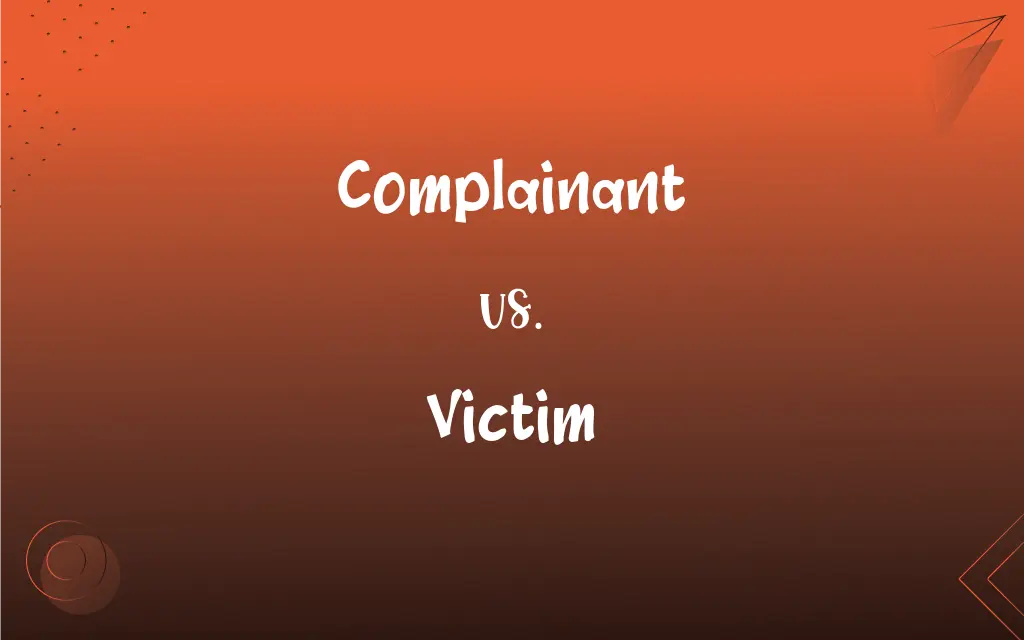Complainant vs. Victim: What's the Difference?
Edited by Aimie Carlson || By Harlon Moss || Updated on November 8, 2023
A complainant is someone who makes a formal accusation or claim, while a victim is someone who has been harmed or wronged.

Key Differences
A complainant is an individual who brings forth a complaint or legal action against another party. A victim is a person who has suffered harm due to an accident, crime, or other adverse act.
The role of a complainant is active in the context of litigation or legal proceedings, as they initiate a complaint or claim. Conversely, being a victim is a passive role that results from someone else's actions, and a victim does not necessarily have to be a complainant in a legal sense.
In legal terms, a complainant is the one who alleges wrongdoing in a formal setting, such as a court or tribunal. The term victim is used to describe an individual's status after suffering from an act, which may or may not be part of a legal case.
A complainant may or may not have suffered harm and could be acting on behalf of others, while a victim has directly or indirectly experienced damage, injury, or loss.
It is possible for a victim to become a complainant if they decide to take legal action concerning their victimization. However, one can be a complainant about issues in which they are not a direct victim, such as reporting public nuisances or breaches of contracts that affect them indirectly.
ADVERTISEMENT
Comparison Chart
Definition
Someone who makes a formal accusation or claim.
Someone who has suffered harm or wrongdoing.
Legal Context
Initiates a complaint or legal action.
May not initiate legal action but has been harmed.
Relation to Wrongdoing
May or may not be personally harmed.
Has been personally harmed.
Role in Proceedings
Active role in bringing forth a case.
Passive role; often the subject of the case.
Necessity for Legal Action
Must take action to be considered a complainant.
Can be a victim without taking legal action.
ADVERTISEMENT
Complainant and Victim Definitions
Complainant
A person who makes a formal accusation in court.
The complainant filed a lawsuit against the company for negligence.
Victim
Someone who suffers from destructive or injurious action.
She became a victim of online identity theft.
Complainant
Someone who brings a complaint before an authority.
The complainant took her case to the housing tribunal.
Victim
A person harmed by a crime, accident, or other event.
The victim of the robbery was too shaken to speak.
Complainant
A party that initiates litigation.
The complainant's lawyer presented new evidence today.
Victim
A creature killed by another animal.
The lion's victim was a lone wildebeest.
Complainant
An individual who claims to have been wronged.
The complainant in the fraud case was asked to testify.
Victim
An individual who has suffered from a disaster.
Aid organizations rushed to help the victims of the earthquake.
Complainant
A person or entity presenting a grievance.
The complainant outlined the issues in a detailed letter to the board.
Victim
A person who is tricked or duped.
He was an unsuspecting victim of the scam.
Complainant
A plaintiff.
Victim
One who is harmed or killed by another, especially by someone committing a criminal or unlawful act
A victim of a mugging.
Complainant
A prosecuting witness in a criminal case.
Victim
A living creature slain and offered as a sacrifice during a religious rite.
FAQs
Does a complainant always seek legal remedy?
Often, but not always; they can also seek resolution through other formal complaints mechanisms.
Is the term "victim" limited to criminal cases?
No, it can refer to anyone who has suffered harm in various contexts.
Are all complainants victims?
Not necessarily; complainants may not have suffered direct harm.
Can someone be a complainant on someone else's behalf?
Yes, a complainant can represent the interests of another party.
Can a victim be a complainant?
Yes, a victim can become a complainant if they file a formal complaint.
Do victims need to prove their status?
In a legal context, the harm suffered often needs to be demonstrated.
Can victims choose not to be complainants?
Yes, victims may decide not to pursue formal complaints for various reasons.
Can organizations be complainants?
Yes, organizations can file complaints in legal or formal settings.
Can a victim file a complaint anonymously?
This depends on the legal jurisdiction and the nature of the complaint.
Is being a victim always a result of illegal activity?
No, one can be a victim of accidents or natural disasters as well.
Can a victim be blamed for their victimization?
Victim blaming is an unfortunate phenomenon, but it is generally discouraged and considered unfair.
What is a victim impact statement?
It's a statement made by the victim about how an event has affected them, often used in sentencing.
Can there be multiple complainants in a case?
Yes, especially in cases involving multiple parties or class-action lawsuits.
Are all victims entitled to compensation?
Not always; it depends on the legal outcome and jurisdiction.
Are complainants protected by law?
There are often legal protections to prevent retaliation against complainants.
Can a complainant withdraw their complaint?
In many cases, yes, though it may depend on the nature of the complaint and the legal process.
Do victims always testify in court?
Not always, but they may be called to testify if the case goes to trial.
Is a complainant's role over once a complaint is filed?
Not always; they may need to participate in further proceedings.
Does a complainant's claim always go to trial?
Not necessarily; many complaints are settled out of court or dismissed.
Is the term "victim" used in civil cases?
Yes, it can be used to describe someone who has suffered harm or injury in civil disputes.
About Author
Written by
Harlon MossHarlon is a seasoned quality moderator and accomplished content writer for Difference Wiki. An alumnus of the prestigious University of California, he earned his degree in Computer Science. Leveraging his academic background, Harlon brings a meticulous and informed perspective to his work, ensuring content accuracy and excellence.
Edited by
Aimie CarlsonAimie Carlson, holding a master's degree in English literature, is a fervent English language enthusiast. She lends her writing talents to Difference Wiki, a prominent website that specializes in comparisons, offering readers insightful analyses that both captivate and inform.































































